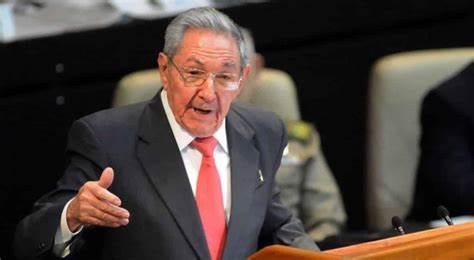For the first time in more than 60 years, Cuba will not be led by a Castro. Raul Castro, the late Fidel's brother, is expected to step down as head of the Communist Party at the party's congress, which begins today, although that does not mean Cuba's one-party system is going to undergo any major changes. We had a really interesting conversation about this with NPR's Carrie Kahn, who covers Cuba.
CARRIE KAHN, BYLINE: Cuba's Communist Party meets every five years. And here's a spoiler alert — there really won't be many surprises this time, mostly because Raul Castro, back in 2018, when he stepped down as president, he said all along he was going to give up the top post of the party this year. And he's almost certainly going to hand it over to his hand-picked president Miguel Diaz-Canel. So Castro is 89 now, and Diaz-Canel is 60. So the biggest change is that it looks like the old guard, what the Cubans like to call the historic generation, those who fought the revolution, will finally hand over the reins to the younger folks.
But I was talking with Arturo Lopez-Levy — he's a Cuban economist at Holy Names University in California — and he says, don't think that only a Castro can control Cuba.
ARTURO LOPEZ-LEVY: This is not a family business. It is more sophisticated and more resilient than what you will find in a government ruled by a group of people that are part of the same clan or the same family.
KAHN: He says the ruling regime is a complex institution, and it's not easily unraveled.
INSKEEP: Is there any specific legacy for Raul Castro, who was so close to his brother for so long, but, of course, was not Fidel?
KAHN: Yes. Raul took over for his brother Fidel back in 2008, and he did bring on some big changes, especially on the economic front. He greatly expanded private enterprise on the island, also the use of cellphones and the Internet. And also, you'll remember, he ushered in the warmer relations with President Obama and the U.S. But it's been more than a decade since he promised those economic reforms, and still not all are in place. And again, that slow move is in spite of Cuba's terrible economic situation, Steve. You know, there are long, long food lines and scarcity that's come back to Cuba. And they are also dealing with COVID, the crash of the tourism industry, spiraling inflation and the Trump administration sanctions, which are still in place.

INSKEEP: Well, given all of that, is the regime very popular in Cuba?
KAHN: It's very tough situation right now. The economic disarray is just fueling a lot of political dissent. And we're seeing protests in Cuba like we're just not used to seeing. And there's this emergence of a new artist revolt that was started by these Afro Cuban rappers, and it's widened to more Main Street artists. And I just want to play you this song. It's huge in Cuba and abroad. It has 4.6 million views so far on YouTube.
(SOUNDBITE OF SONG, "PATRIA Y VIDA")
ALEXANDER DELGADO: (Singing in Spanish).
KAHN: And many will recognize that gritty baritone vo ice. That's the Cuban artist Alexander Delgado, and he's from the duo Gente de Zona. And he and other Cuban artists produced this song. It's called "Patria Y Vida." And it's a flip of the Cuban revolutionary call to arms. And Delgado sings in the song — it's astonishing — no more lies, my people want freedom. We won't shout homeland or death anymore — that's the famous slogan — but now it's homeland and life. And it's a pretty bold move and shows a growing movement challenging the regime like we haven't seen in decades.
INSKEEP: Carrie, thanks so much.
KAHN: No, thank you.
INSKEEP: That's NPR's Carrie Kahn.












